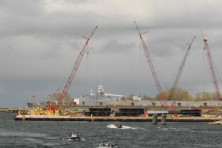Proposed Fishing Tourney Rule Changes Referred Back to Committee
- Share
- Tweet
- Pin
- Share

Proposed fishing tournament rule changes related to the use of City of Sturgeon Bay facilities – which could go into effect in 2024 – were referred back to the Joint Parks and Recreation Committee/Board on April 4 by the Sturgeon Bay Common Council.
The committee/board in February backed an amendment from municipal services director Mike Barker to limit the use of city facilities for holding catch-and-release bass tournaments in June to only the weigh-on-the-water variety.
In an effort to protect smallmouth-bass spawning, the new rule would have prohibited the issuance of permits for bass tournaments held prior to June 30 unless the weigh-on-the-water format is used. Scales to weigh the fish would be available at no cost.
That rule would prohibit city facilities from being used in May for the Sturgeon Bay Open Bass Tournament (SBOBT), which does not use a weigh-on-the-water format. Instead, it weighs fish taken to shore before releasing them back into the water in spots where they may or may not have been caught.
Proponents of the weigh-on-the-water format want to limit the amount of time that smallmouth bass are removed from their nests during the spawning period because of concern that taking the fish to shore to be weighed at a central location could negatively affect the bass population.
One of those proponents, Mark Holey, who previously worked as a fish biologist for the Wisconsin Department of Natural Resources (DNR) and the U.S. Fish and Wildlife Service, spoke during the council’s public-comment period in favor of allowing only weigh-on-the-water bass tournaments prior to June 30.
Holey said that not allowing the use of city facilities for bass tournaments that weigh the fish on shore only during the month of June doesn’t go far enough.
“I believe it should also include the month of May, and actually to have [the] greatest impact, should be required throughout the entire year,” he said. “In the whole discussion about catch-and-hold versus immediate-release fishing tournament formats, I have yet to hear from those opposing weigh-on-the-water why they cannot adopt that format. The primary comment I hear is that if [the] weigh-on-the-water format is required, they would have to move their tournaments somewhere else, but they never say why immediate-release cannot work for their tournament.”
Holey urged the council to “apply the best management practices available to achieve the most fish-friendly tournament format and realize the smallest negative impact as possible on our smallmouth-bass fishery.”
A bass angler from Fish Creek, Paul Kwiatkowski, also urged the council to adopt the weigh-on-the-water requirement for bass tournaments held prior to June 30.
“There’s a lot of concern about the amount of money that tournaments bring in here, and for some reason, weigh-on-the-water is going to drive tournaments away for a reason that I don’t think anybody really understands – why they don’t want to use that particular format,” he said. “[Major League Fishing], which is the premier fishing tournament organization in the United States, uses weigh-on-the-water. They used it up here.”
Kwiatkowski said that having only weigh-on-the-water bass tournaments would better manage the fishery for the entire open-water time of the year.
Those speaking against adopting a weigh-on-the-water requirement included JJ Malvitz, who represented the SBOBT.
Though the amended restriction recommended by the committee/board would not affect the SBOBT held annually in May, Malvitz called limiting bass tournaments to only the weigh-on-the-water variety an “overreach for the City of Sturgeon Bay to limit access to a public resource for an organization.”
“The State of Wisconsin has the authority to make rules and regulations for lands and waters owned by the state,” he said. “We work very closely with the DNR to obtain the necessary permits, understand the best fish-handling practices and the best live-release methods. Our tournament is a catch-and-release tournament. Fish care is always No. 1.”
Malvitz questioned whether the city had the proper information to adopt a weigh-on-the-water format, which he said could have “major financial ramifications for businesses when anglers take their dollars outside of Sturgeon Bay. This is not a stigma a municipality wants to have within the angling community.”
The SBOBT, which is slated to hold its 33rd tournament May 19-20 at Sawyer Park in Sturgeon Bay, has, in past years, been headquartered there and in Little Sturgeon.
Malvitz said he is against switching the SBOBT to the weigh-on-the-water format, which could result in catching the same fish multiple times and adding stress to them, compared to keeping five bass in a livewell and taking them to shore to be weighed, which “adds 100% validation to the competition.”
He said the top anglers are “driven by the competition” to want to spend money on the $510 entry fee and related expenses to participate in the SBOBT, which has seen the average weight of the fish caught increase over the years to indicate the strength of the local bass fishery.
Malvitz has also called on District 5 alderman Gary Nault, who runs the weigh-on-the-water Sturgeon Bay Bass Tournament in May, to recuse himself from voting on the proposed rule changes.
“These proposed rules could benefit this type of tournament format and could have financial benefits for that organization,” Malvitz said.
Nault said he was advised by the city attorney that he could discuss the proposed changes but should not vote on them.

Jimmy Doering, a smallmouth-bass fishing guide from Sturgeon Bay, also opposed a weigh-on-the-water format, citing similar concerns that Malvitz had about overreach by the city.
“You shouldn’t limit what we’re doing as anglers,” he said. “This is America. We should have a choice in what kind of derby we want to fish. So, if we want to fish a tournament where we put five fish in a livewell, and they’re taken care of like kings and released back into the bay, we should be allowed to do that.”
Doering said he’s heard the fishery is declining, but that’s not his experience.
“I have about 150 days a year [to operate as a fishing guide], and I have clients that travel up to 1,200 miles to fish for smallmouth, so that’s not the case at all.”
District 1 alderwoman Helen Bacon, who chairs the committee/board that recommended the change, said a couple of the committee/board members contacted her after the February meeting.
“After the board had time to think about it, then they seemed to have a lot of questions,” she said.
Given that the proposed rule revisions wouldn’t take effect until 2024, should they be adopted, District 3 alderman Dan Williams said there’s no rush to make a decision.
“I think sometimes we get pressure and feel like we need to make a quick decision, and I think it’s better to get it right and to take that time to do that,” he said.
District 4 alderman Spencer Gustafson, a committee/board member, said a state-led study is now going on related to fishing tournaments, but the results won’t be available until next spring.
“I feel like we’re jumping the gun on even dealing with this matter, because I feel like the state should really be making the call here,” he said.
Gustafson – who stated in February that he didn’t believe it’s his place to judge which version of a tournament would be better – was the only council member to vote against referring the proposed rule changes back to the committee/board for further consideration during its April 26 meeting.






